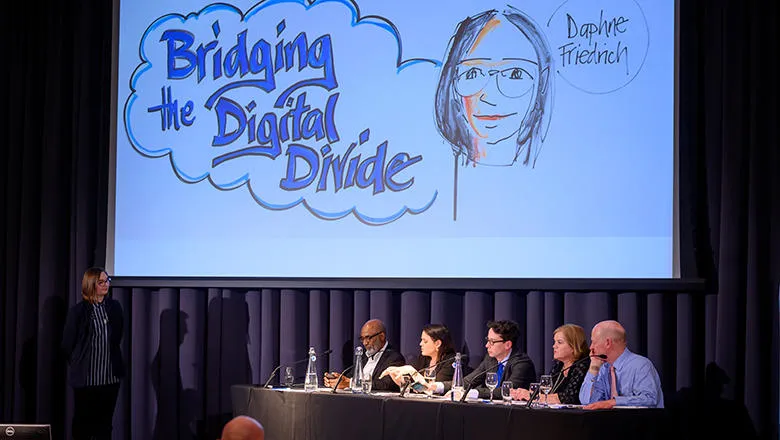14 November 2019
Tackling the digital divide
Daphne Friedrich
DAPHNE FRIEDRICH: Many people have been left behind in the digital revolution, by battling digital exclusion we can also battle social exclusion, reducing inequality and creating greater autonomy amongst vulnerable groups.

This piece is part of a blog series from the student finalists of Policy Idol 2019. Through the series, we're sharing students' policy ideas for changing the world, which they pitched at the competition earlier this year.
Find out more about Policy Idol
The “Digital divide” is the gap between those who have access to modern information and communication technology, such as the internet, and those who don’t. As many as eight million people in the UK do not use the internet and 90 per cent of them suffer from other kinds of economic or social disadvantages. They are more likely to be in the lowest income bracket and/or be disabled with long-standing health conditions. Since many day-to-day activities such as communication, banking, shopping and government services are moving to online platforms, the digital divide could further aggravate existing inequalities.
The internet has the potential to bring about positive change to people’s lives. It can facilitate access to cheaper goods, better services, and specialised support for the elderly, incapacitated or lower-income individuals living in rural areas. Thus, if individuals can seize the opportunities offered by the internet, it can play a role in reducing inequalities of access rather than widening existing gaps.
Notwithstanding the benefits of internet connectivity, the existing services available to people such as access to computers in local libraries and digital courses provided by community centres and charities, are not doing enough to bridge the gap.6 While some make an informed choice to stay offline, many people hesitate for various reasons. They could be unaware of the benefits of the internet in their lives or worry that new technology is out of their comfort zone, so they prefer not to engage with it.
To tackle this problem, we need to target the people currently excluded from the internet in a way that appeals to them. For example, the best way to engage especially, but not exclusively, older people is through positive experiences and winning conversations. Consequently, a community-based volunteering scheme may help to connect existing local resources with excluded individuals.
Local community centres are well-placed to provide the necessary infrastructure, organisation and coordination for volunteers. However, community centres may not be ideally placed to reach the excluded individuals. Instead, GP surgeries, hospital wards and discharge lounges are more promising points of contact for an initial approach, since for a variety of reasons digitally excluded individuals tend to be in poorer health than the average internet user.
Volunteers should be young individuals interested in working in the medical, care or social professions. Participating in such a programme would be attractive to volunteers as it would allow them to use modern technology and share their knowledge on basic skills, whilst interacting across generations, backgrounds and cultures. Elderly individuals would feel valued and included by the support they received. Moreover, intergenerational exchanges, if conducted reciprocally can further solidarity and social cohesion in the community, which may bridge more than just the digital division, especially in times of ever loosening family structures.
To be a success, the project would need to be tested and refined with a pilot in a digitally deprived community. The scheme would focus on introducing individuals to the advantages of online connectivity through topics that are relevant to the target group. For example, elderly people tend to use the internet to keep in touch with family or to claim their pension. Giving non-digital savvy individuals a positive experience of the internet could lead to increased confidence and a new openness to learning more.
Moreover, elderly and sick individuals often suffer from social isolation and exclusion. While online communities of people with similar conditions and concerns may not replace face-to-face interactions, they could nonetheless mitigate against feelings of loneliness and isolation, which is even more important considering that people are living for longer than ever.
Technological change drives progress. But many people have been left behind in the digital revolution, in the same way they have been left behind by society and policy-makers. Digital and social exclusion can be battled together, reducing inequality and creating greater autonomy amongst vulnerable groups, thereby sustainably closing an important gap in our divided society.
Daphne Friedrich is an undergraduate student in Philosophy, Politics and Economics at King's College London.
